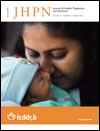Interstitial Lung Disease and Profound Hypoxaemia in a Severely-malnourished Child with Very Severe Pneumonia and Potential Lymph-node Tuberculosis: An Uncommon but Serious Co-morbidity
DOI:
https://doi.org/10.3329/jhpn.v31i1.14758Keywords:
Hypoxaemia, Infant, Interstitial lung disease, Lymph-node tuberculosis, Severe malnutrition, Very severe pneumoniaAbstract
A nine-month old boy was initially admitted at the Acute Respiratory Infection Unit of Dhaka Hospital of icddr,b and soon after transferred to the Intensive Care Unit of the same hospital. The boy had problems of very severe pneumonia (confirmed by radiology), severe hypoxaemia, severe malnutrition, and Downs syndrome. The patient was treated according to the hospital protocol for the management of pneumonia and malnutrition. During the hospital stay, hypoxaemia was persistent with very little improvement of pneumonia; a number of differentials, such as pneumocystis jirovecii pneumonia, lymph-node tuberculosis, were added to the problems. Subsequently, the patients hypoxaemia improved with the empirical use of antitubercular drugs. However, the patient again developed persistent hypoxaemia and, after unsuccessful treatment for a hospital-acquired pneumonia, the problems further expanded to include interstitial lung disease (ILD). This was confirmed by high-resolution computed tomography, and the patient was treated with prednisolone for 6 months, along with antitubercular drugs. He fully recovered from ILD, hypoxaemia, and pneumonia both clinically and radiologically. Therefore, severely-malnourished children having wet cough and pneumonia with persistent hypoxaemia should be assessed for the possible existence of interstitial lung disease. This may help provide a prompt and appropriate management to reduce morbidity and deaths in such patients.
J HEALTH POPUL NUTR 2013 Mar;31(1):133-137
Downloads
305
259

